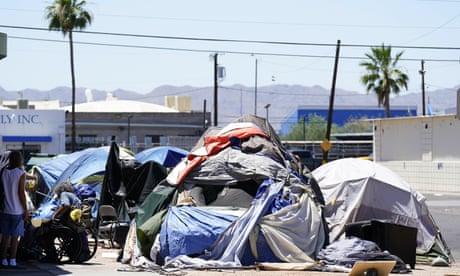- by foxnews
- 23 May 2025
As many as 500 homeless people died in Phoenix area in first half of 2022
As many as 500 homeless people died in Phoenix area in first half of 2022
- by theguardian
- 22 Jul 2022
- in news

The number of unsheltered people in Maricopa county, which includes the state capital Phoenix, has at least tripled since 2016.
Drugs played a role in the majority of the deaths in which the medical examiner was able to determine the cause. In one case, a 26-year-old Black male partying with friends died after taking opiates, cocaine and benzodiazepines. In another case, a 32-year-old Indigenous woman died from a fentanyl overdose.
African Americans and Indigenous people disproportionately experience homelessness in Maricopa county, and are overrepresented in the death toll.
The Department of Justice is investigating the police department over the excessive use of force, discriminatory policing and inappropriate treatment of homeless people, among other allegations.
Phoenix is the hottest city in the US and has the highest number of heat related deaths. Heat deaths are preventable, but being outside without adequate shade and water increases the risk of medical complications, toxic drug complications and deadly heat exposure.
People experiencing homelessness have an average life expectancy of about 50 years of age, almost 20 years lower than housed populations, in large part due to a greater risk of infectious and chronic illness, poor mental health, and substance abuse, according to the CDC.
At least 21 people experiencing homelessness die every day in the US, according to one observatory. Almost all are preventable.
Stacey Champion, a local advocate for better heat and housing policies, described the death toll as crushing.
Nationwide, seniors are the fastest growing group in the homeless population, with many finding themselves on the streets for the first time due to unaffordable rents, medical debts, job insecurity and family rifts. More than 160 people who died between January and June were over 55 years old.
Thirteen deaths were recorded as suicides . More than 30 people were hit and killed by cars, including a 37-year-old woman who was struck while crossing the road by a vehicle that fled the scene.
- by foxnews
- descember 09, 2016
United Airlines flight returns to Hawaii after concerning message found on bathroom mirror; FBI investigating
United Airlines Flight 1169 to Los Angeles returned to Hawaii after a "potential security concern" aboard the plane. The FBI and police are investigating.
read more


